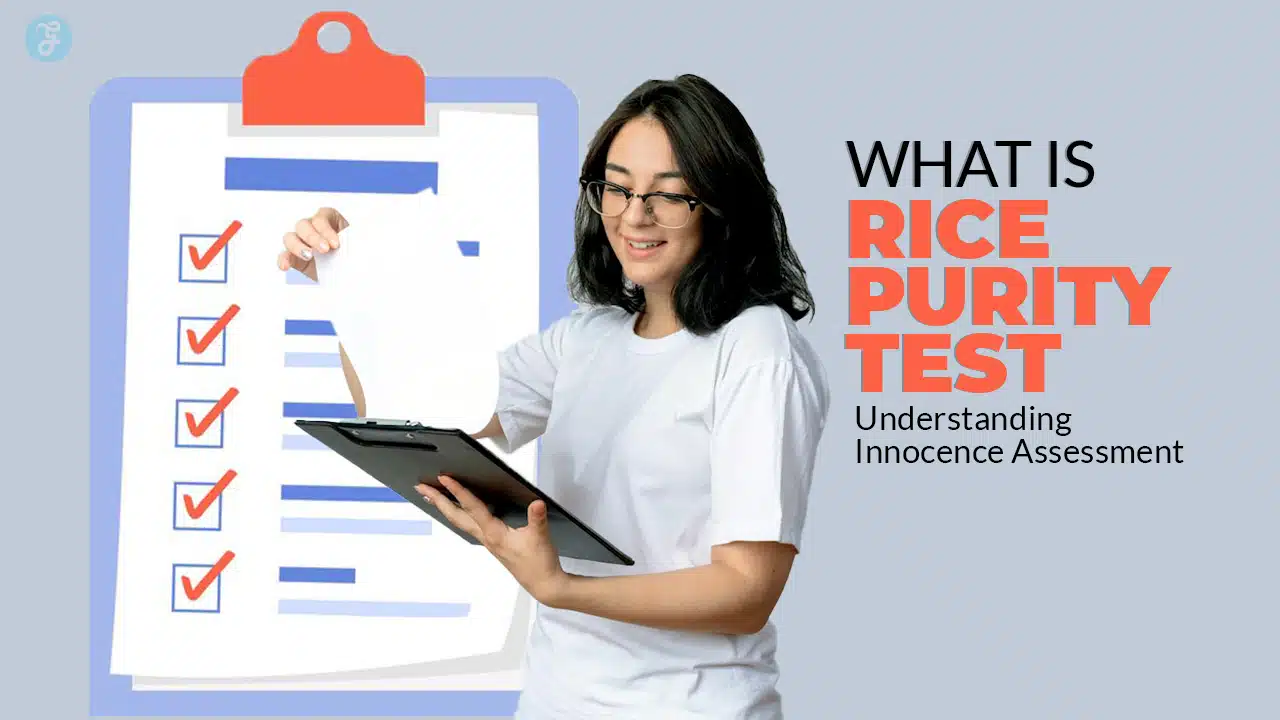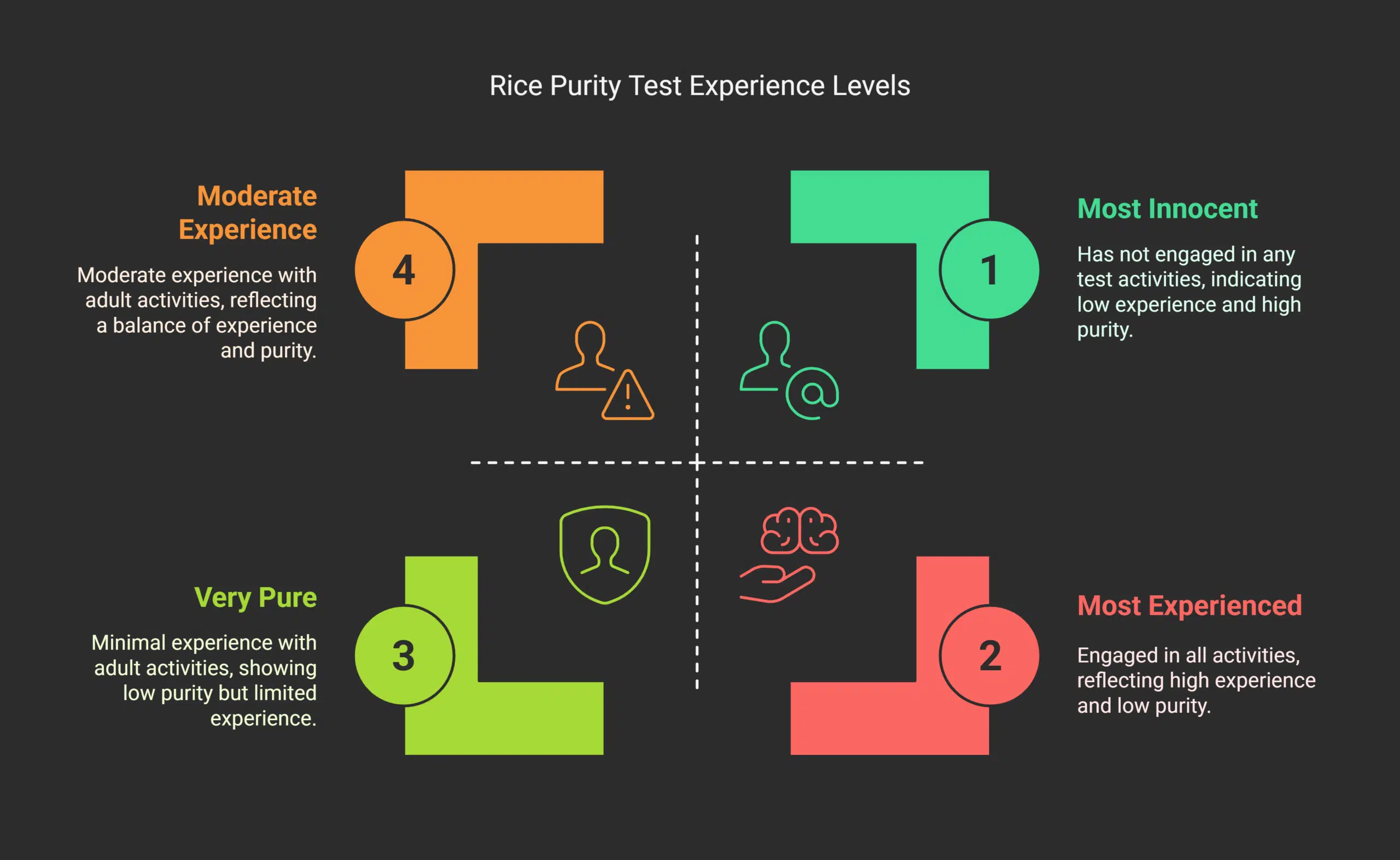Have you heard friends talk about their “purity score” and felt lost? The Rice Purity Test has become a hot topic among college students and young adults. This self-graded survey asks 100 questions about your life choices and gives you a score.
Many people take this test at parties or with friends to see how “pure” or “innocent” they are.
The Rice Purity Test started at Rice University in Houston, Texas. It asks about things like kissing, dating, and other personal acts. Your score can range from 0% to 100%, with higher scores meaning more “innocent.” The test isn’t made by mental health pros and isn’t meant to judge you.
This blog will explain what is rice purity test and what the test covers, how scoring works, and why it became so popular. Ready to learn more?
Key Takeaways
- The Rice Purity Test started at Rice University back in the 1960s—it’s basically a quiz with 100 simple yes-or-no questions. It asks about your personal life to check how “innocent” you are.
- Scores go from 0% all the way up to 100%. Higher scores mean you’re more “innocent”, and a range of 85-91 is usually considered pretty good for someone under 25.
- Questions touch on things like dating, drugs, sexual experiences, trouble with the law, and silly college pranks. Originally, they created it just to help freshmen meet people during orientation.
- Most people end up somewhere in the middle. On average, North Americans score around 62, Asians about 67, Australians roughly 64.3, and students from the U.S. come in at 63.9.
- Not everyone likes this test, though—critics argue it’s not based on science. Some worry it can shame regular behavior or encourage you to do risky things just to get a lower score.
What Is Rice Purity Test?
The Rice Purity Test is a simple quiz with 100 yes-or-no questions. It started in the 1960s at Rice University in Houston, Texas. Students take this test during Orientation Week as they begin college life.
The Rice Thresher newspaper created and now runs this self-graded survey. Questions ask about your past actions in areas like sex, drugs, and breaking rules. Your score shows how “pure” or innocent you are, with 100 being the most pure.
Many college students take this test for fun or to compare scores with friends. The test covers many topics, from kissing to more adult acts, giving a wide view of a person’s life choices.
Next, we’ll look at why this test exists and what it aims to do.
The Purpose of the Rice Purity Test
Now that we know what the Rice Purity Test is, let’s talk about why it exists. Rice University made this test for new students to bond with each other. During O-week groups, students take the test together and share scores.
This helps break the ice and starts fun talks among kids who just met. The test also lets students track how their choices change during college years.
Many students use the test just for fun at parties or sleepovers. With scores from 0% to 100%, friends can compare their life choices without shame. A score between 85 and 91 is seen as “good” for people under 25.
But this test is not a real mental health tool. No clinical psychologist would use it to judge someone’s worth. It’s free and meant only for laughs, not as a true measure of anyone’s value or goodness.
How the 100 Questions Are Structured
The Rice Purity Test sorts its 100 questions into clear groups like drug use, sex acts, and legal issues, with each “yes” answer lowering your score from the perfect 100 – check out the full test to see where you stand on the purity scale!
Topics Covered in the Test
The Rice Purity Test asks about many parts of life that young adults might face. These 100 questions cover actions and choices that range from mild to very personal.
- Romantic experiences like holding hands, kissing, and dating appear in many questions.
- Sexual behavior forms a large part of the test, asking about different acts and experiences.
- Substance use questions check if you’ve tried alcohol, tobacco, or other drugs.
- Legal issues come up in questions about breaking rules, getting arrested, or doing illegal things.
- College pranks and dorm life show up in questions about school behavior.
- Personal choices like cheating on tests or lying to friends are included.
- Body changes and self-image questions ask about things like tattoos or piercings.
- Risk-taking behavior, such as skinny dipping or public acts, appears in several questions.
- Travel and adventure items ask about places you’ve been or things you’ve done away from home.
- Relationship status questions check if you’ve been in love or had your heart broken.
The scoring system helps make sense of all these topics and what your answers might mean about your life experiences.
Scoring System and Its Interpretation
The Rice Purity Test uses a percentage system to rate innocence levels. Each “no” answer adds one point to your purity score. Your final score shows where you fall on the spectrum from completely innocent to highly experienced.
| Score Range | Interpretation | Boys (%) | Girls (%) |
|---|---|---|---|
| 100 | Most innocent—has not engaged in any activities mentioned in the test | 0.75% | 0.82% |
| 99-95 | Very pure—minimal experience with adult activities | 8.32% | 9.79% |
| 94-90 | Pure—limited experience with adult behaviors | 9.19% | 9.52% |
| 69-50 | Moderate experience with adult activities | 25.74% | 26.72% |
| 0 | Most experienced—has engaged in all activities mentioned in the test | 0.55% | 0.52% |
Numbers show boys and girls score quite similarly across ranges. Most people fall in the middle ranges, with very few at either extreme. Your score offers a snapshot of your experiences compared to peers, though it shouldn’t define your self-worth or values.
Popularity and Cultural Impact of the Test
The Rice Purity Test has spread far beyond its Houston, Texas roots to become a college ritual across America. Students often take this self-graded survey during freshman orientation or at dorm parties.
The test shows clear patterns across regions—North Americans score an average of 62, while Asians tend to be more reserved with an average score of 67. U.S. students score about 63.9, slightly lower than Australians at 64.3.
These numbers show how the test has grown into a global tool for comparing social habits.
Social media has helped the test gain fans outside college walls. Many people share their scores online, turning this once-campus quiz into a viral trend. Friends dare each other to take it, and some use their scores to find others with the same life choices.
The test now serves as both a game and a mirror of changing social norms. This simple 100-question list has become a unique way to start talks about personal choices and values. Next, we must look at the many issues and debates that have grown around this popular test.
Criticisms and Controversies Surrounding the Test
The Rice Purity Test faces strong criticism for its focus on sexual acts and behaviors. Many mental health experts point out that the test lacks any scientific basis or validity in clinical psychology.
Since 2019, five websites have copied the test, spreading its reach without improving its accuracy. Critics worry that the test may shame people for normal life choices or make them feel bad about their past actions.
The scoring system can make students feel pressure to try risky things just to lower their scores.
Some college staff worry that the test turns serious issues like drug use into games. The test asks about things like “sexual intercourse” and joining the “mile high club” without talking about consent or safety.
This might push young adults to make poor choices. While the test claims to offer “fun facts” and “statistical reports,” these lack real meaning since the test is not a true mental health tool.
Most experts suggest that talks about growing up should focus on respect and good choices instead of a simple number score.
Takeaways
The Rice Purity Test offers a playful way to reflect on your choices in life. With 100 different questions, it lets people talk openly about things that might feel awkward otherwise.
Some folks enjoy using it to get conversations started at parties, while others think it puts too much attention on sexual experiences. In reality, it’s just a quiz—a way to laugh, chat, and maybe even learn something new about your friends.
Your final score is only a number, though. What truly counts is being kind to others, treating people fairly, and making decisions you’re comfortable with.
FAQs on What is Rice Purity Test
1. What is the Rice Purity Test?
The Rice Purity Test is a self-scored quiz with 100 yes-or-no questions about life choices you’ve made. Created at Rice University in Houston, Texas, it assesses how “innocent” or “experienced” college students are. Questions range across topics including sexual experiences, rule-breaking, and risk-taking behavior.
2. How does the Rice Purity Test work?
You simply answer 100 quick yes-or-no questions about your past experiences. These questions cover topics such as sexual activities, breaking campus rules, disciplinary troubles, and risky college behaviors. Your results give a “purity score”—100 means completely innocent, and lower scores indicate more experience.
3. Is the Rice Purity Test a real psychological assessment?
Not at all. Unlike genuine psychological exams, mental health professionals don’t use the Rice Purity Test to measure your mental health. It’s meant purely for enjoyment and entertainment among college students, not as an actual evaluation of your emotional or mental well-being.
4. What kinds of questions does the Rice Purity Test ask?
The test covers a wide variety of activities—from basic sexual experiences and masturbation to more unusual things, like joining the “mile-high club”. Questions also address behaviors like sending late-night “booty call” texts and breaking college regulations. Some topics might feel awkward or embarrassing for certain participants.
5. Should I be worried about my Rice Purity Test score?
Your test score doesn’t reflect your personality or worth. Many college students take it simply for amusement or curiosity, without worrying about honest responses. The test doesn’t require complete honesty—and honestly, the final number doesn’t impact your daily life or future.







































